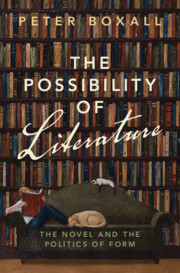Book contents
- The Possibility of Literature
- The Possibility of Literature
- Copyright page
- Dedication
- Epigraph
- Contents
- Figures
- Acknowledgements
- Introduction
- Part I On Writers
- Part II On Literary History
- Part III On the Contemporary
- Chapter 12 Imagining the Future in the British Novel
- Chapter 13 Shallow Intensity
- Chapter 14 To Carry Now Away
- Chapter 15 On Rereading Proust
- Notes
- Bibliography
- Index
Chapter 15 - On Rereading Proust
from Part III - On the Contemporary
Published online by Cambridge University Press: 10 October 2024
- The Possibility of Literature
- The Possibility of Literature
- Copyright page
- Dedication
- Epigraph
- Contents
- Figures
- Acknowledgements
- Introduction
- Part I On Writers
- Part II On Literary History
- Part III On the Contemporary
- Chapter 12 Imagining the Future in the British Novel
- Chapter 13 Shallow Intensity
- Chapter 14 To Carry Now Away
- Chapter 15 On Rereading Proust
- Notes
- Bibliography
- Index
Summary
At the close of Proust’s A La recherche, Marcel reflects on his late discovery that there is within him a ‘vast dimension’ of lost time, composed of moments that ‘still adhered to me and that I could still find again, merely by descending to a greater depth within myself’. The vehicle through which he is to achieve that descent, he thinks to himself, is the novel itself, the novel he is now to write.
A la recherche is, for this reason, a novel which demands to be reread, a novel which reveals the structural necessity of rereading that inhabits all acts of being in time. This essay responds to this demand, and this necessity, by reading Proust’s novel as an exercise in rereading. The epiphanic close to the novel rests on the conviction that there will come a form of writing, and a form of reading, that might absorb lost time into itself, and in so doing stage a recovery of a spent past, and of a spent life. But in calling in this way for its own repetition, the novel can only live, again, through the loss that it seeks to overcome. This inescapable play between recovery and loss, though, does not constitute a failure of the hope that the novel seems, on each reading, to rediscover. Rather, in inserting a logic of rereading into its own expressive mechanism, the novel becomes a scale for weighing those elements of time that are recoverable against those that are not. It allows us to see the novel as a differential machine, that can find the junction, in the contemporary moment of reading, between that which can be saved and that which cannot – the junction that is the horizon, in our own time, of literary, political and personal possibility.
- Type
- Chapter
- Information
- The Possibility of LiteratureThe Novel and the Politics of Form, pp. 308 - 339Publisher: Cambridge University PressPrint publication year: 2024

